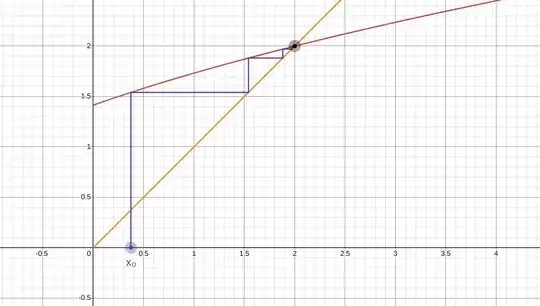Define the sequence $(x_n)_{n \geq 0}$ with $x_0 >0$ and recursive equation $x_{n+1} = \sqrt{2+x_n}$ for all $n \geq 0$. I wish to determine the limit of the sequence $(x_n)_{n \geq 0}$ in terms of the parameter $x_0 \in (0, \infty)$.
If $x_0 < 2$, then $x_n > 0, (\forall)n \geq 0$, $x_n < 2, (\forall)n \geq 0$ and $(x_n)_n$ is strictly increasing. By Weierstrass' property, there exists $\ell = \lim_{n \to \infty} x_n \in \mathbb{R}$. Taking the limit, obtain $\ell^2-\ell-2=0$ with solutions $\ell \in \{-1,2 \}$. But since the $x_n>0, (\forall)n \geq 0$, $\ell \geq 0$ so $\lim_n x_n=2$.
If $x_0=2$, then $x_n=2, (\forall)n \geq 0$ constant sequence, so $\lim_n x_n=2$.
If $x_0>2$, then $x_n > 0, (\forall)n \geq 0$ and $(x_n)_n$ is strictly increasing. However, because $x_0>2$ we would have $x_n > 2, (\forall)n \geq 0$. But we know already that the only possible limit points of the sequence are $\lim_n x_n \in \{ -1,2, \pm \infty \} \subset \overline{\mathbb{R}}$, so does that mean the sequence diverges or am I missing something?
In conclusion, the question is: How do I analyse the sequence when $x_0>2$? Is the sequence divergent?
